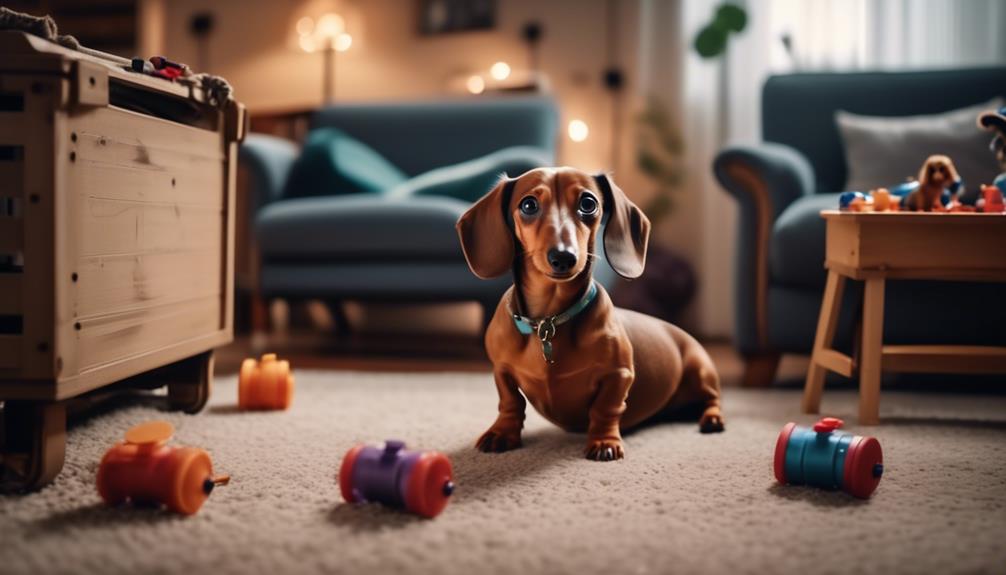When to Consider a Dachshund for a Small Living Space

Consider a Dachshund for a small living space if you're aware of their exercise needs. Dachshunds are a small breed that can adapt well to apartment living. They don't require a large yard to run around in. However, this doesn't mean that they don't need exercise. Dachshunds still need regular exercise to keep them healthy and prevent obesity.
In terms of adaptability, Dachshunds are known for being adaptable to different living situations. They can adjust well to living in small spaces as long as they are given enough mental and physical stimulation. They are also generally good with apartment living as long as their exercise needs are met.
Another factor to consider is their barking behavior. Dachshunds are known to be vocal dogs and can be prone to excessive barking. This can be a challenge in a small living space, especially if you have neighbors in close proximity. Proper training and socialization can help to manage their barking behavior.
Lastly, it is important to consider the health considerations of Dachshunds. They are prone to certain health issues, such as back problems, obesity, and dental issues. Regular veterinary check-ups and a balanced diet can help to prevent and manage these health concerns.
In summary, if you're considering a Dachshund for a small living space, make sure you are aware of their exercise needs, adaptability, barking behavior, and health considerations. With proper care and attention, Dachshunds can thrive in small living spaces.
Key Takeaways
- Dachshunds are well-suited for small living spaces like apartments or small homes due to their small size and lower exercise requirements.
- Daily exercise, both physical and mental, is crucial for the overall well-being of Dachshunds in a small living space.
- Proper house-training and socialization are important to ensure the Dachshund is comfortable and well-adjusted in a confined environment.
- Providing opportunities for outdoor exercise, managing barking behavior, and giving affection and attention are essential for Dachshunds in a small living space.
Size and Space Requirements
Dachshunds, being small in size, are well-suited for living in small apartments or homes. Despite their small stature, Dachshunds still require designated spaces for eating, sleeping, and playing. However, they don't need a large area to roam and can be content in a smaller living space.
Regular exercise is crucial for the health and happiness of Dachshunds living in apartments. While they may not have a backyard to run around in, daily walks and playtime indoors can provide the necessary physical activity. Mental stimulation is also important, as Dachshunds are intelligent dogs that thrive on challenges and problem-solving tasks. Puzzle toys or interactive games can keep them mentally engaged.
Potty training is another consideration for Dachshunds in apartments. It's important to establish a routine and provide appropriate potty accommodations, such as pee pads or a designated area outside. Consistency and positive reinforcement are key to successful potty training.
When considering a Dachshund for a small living space, it's essential to be mindful of their potential for separation anxiety. Dachshunds are known for their loyalty and attachment to their owners. Ensuring they receive enough attention, affection, and mental stimulation can help prevent or minimize separation anxiety.
Exercise Needs and Energy Levels

To ensure the health and well-being of a Dachshund in a small living space, it's important to understand their exercise needs and energy levels.
Dachshunds are an energetic dog breed that require daily exercise to prevent behavior problems and keep them mentally and physically healthy. Apartment life can present challenges in providing enough exercise, but it's essential for Dachshunds to have an outlet for their energy.
Establishing a walking routine for your Dachshund is a great way to fulfill their exercise needs. Regular walks not only provide physical activity but also mental stimulation as they explore their surroundings. Lack of mental stimulation can lead to destructive behavior and excessive barking, so it's crucial to keep your Dachshund's mind engaged.
If you're unable to let your Dachshund out every four hours, consider hiring a dog walker or taking them to doggy daycare to prevent pent up energy.
Adaptability to Small Living Spaces

Living in a small space can present challenges, but Dachshunds have proven to be adaptable to these environments. If you live in an apartment or have limited space, a Dachshund may be a good fit for you. These dogs have a small size, making them well-suited for small living spaces. Unlike larger breeds, Dachshunds have lower exercise requirements, which means they don't need as much space to run around. However, it's still important to keep them active to prevent obesity and keep them mentally stimulated.
One advantage of Dachshunds is that they can be easily potty trained to use indoor potty pads. This makes them more adaptable to apartments where taking them outside for bathroom breaks may not always be convenient. Additionally, Dachshunds are generally quiet and don't bark excessively, which is beneficial for apartment living where noise can be a concern.
When considering a Dachshund for a small living space, it's essential to remember that they still need regular exercise and mental stimulation. This can be achieved through short walks, playtime, and puzzle toys. It's also important to provide them with a designated space for their bed and toys. By considering these factors, you can ensure that your Dachshund thrives in a small living space.
Temperament and Compatibility With Apartment Living

With their adaptable nature and small size, Dachshunds are well-suited for apartment living. Here are some key considerations regarding temperament and compatibility with apartment living:
- Temperament: Dachshunds are generally quiet and don't bark excessively. However, proper training is crucial to prevent excessive barking in an apartment setting. This can be achieved through positive reinforcement techniques and consistency.
- Potty training: Dachshunds can be successfully potty trained to use designated indoor or outdoor areas. Consistency, patience, and positive reinforcement are key to successful potty training in a small living space like an apartment.
- Exercise and mental stimulation: Despite living in a small space, Dachshunds still need regular exercise to prevent obesity and keep them mentally stimulated. Indoor activities like puzzle toys, treat dispensers, and indoor obstacle courses can provide mental engagement and physical exercise for Dachshunds in an apartment setting.
- Alone time: Dachshunds are generally loyal and affectionate dogs that enjoy spending time with their owners. However, they also need some alone time to rest and relax. Providing a cozy and comfortable space for them to retreat to in the apartment is important.
Barking Behavior and Noise Considerations

Excessive barking in Dachshunds can present challenges in an apartment setting, requiring proper training and management techniques. Dachshunds are known for their tendency to bark, which can be a source of frustration for both the dog owners and neighbors. It's important to address this behavior early on to ensure a peaceful living environment.
Training and socialization are key in controlling excessive barking in Dachshunds. By providing them with consistent guidance and positive reinforcement, you can teach them appropriate barking behaviors. Distractions and activities can also help minimize excessive barking. Keeping your Dachshund mentally and physically stimulated through interactive toys and regular exercise can make them less likely to bark out of boredom or frustration.
However, it's important to note that every Dachshund is different, and some may have a more predisposition to barking than others. In cases where excessive barking persists despite your efforts, professional training may be necessary to address the behavior effectively. By being proactive and attentive to your Dachshund's needs, you can create a harmonious living environment in your small apartment.
Training and Socialization in a Confined Environment

Training and socialization play a crucial role in ensuring a well-behaved and well-adjusted Dachshund in a small living space. Living in an apartment or a smaller space presents unique challenges, but with the right approach, you can help your Dachshund thrive.
Here are three key points to consider:
- Exercise and mental stimulation: Dachshunds need plenty of exercise to prevent boredom and destructive behavior. Regular walks, playtime, and puzzle toys can keep them physically and mentally engaged. Utilizing the space in your apartment effectively can provide opportunities for exercise, such as playing fetch in a hallway or using interactive toys in a confined area.
- House-training: It's crucial to train your Dachshund to potty in a designated area, especially when living in an apartment. Establish a consistent routine for bathroom breaks, reward your dog for using the designated spot, and be patient as accidents may happen during the training process.
- Socialization: Dachshunds are known for their loyalty, but they can also be wary of strangers and other animals if not properly socialized. Regular exposure to different people, sounds, and animals, as well as visits to the park or puppy playdates, can help your Dachshund become more comfortable and well-adjusted in a confined environment.
Health Considerations for Dachshunds in Small Spaces

Maintaining the health of a Dachshund in a small living space requires careful consideration and proactive measures. While Dachshunds can adapt well to apartment living due to their small size, there are several health considerations to keep in mind.
Regular exercise and mental stimulation are crucial for their overall well-being. In a small living space, it's important to provide opportunities for exercise and play to prevent obesity and boredom. Consider enlisting the help of dog walkers or daycare services during the day to ensure your Dachshund gets enough physical activity.
Additionally, providing chew toys and indoor potty accommodations is essential for their comfort and hygiene. It's important to note that Dachshunds should still have access to outdoor exercise, even in a small living space. Taking them for walks or finding nearby parks for them to explore can help fulfill their exercise needs.
Lastly, managing barking and providing affection are key considerations for Dachshunds in small living spaces. Excessive barking can disturb neighbors, so training and socialization are important to address this behavior. Affection and attention from their owners can help prevent anxiety and loneliness.
While a small living space can be challenging, with proper care and attention, a Dachshund can thrive in an apartment setting.
Frequently Asked Questions
Are Dachshunds Good in Small Spaces?
Dachshunds are well-suited for small living spaces due to their small size and adaptability. However, it's important to provide them with regular exercise, mental stimulation, and training to ensure their well-being and prevent behavior issues.
How Much Space Do Dachshunds Need?
Dachshunds require regular exercise to stay mentally and physically healthy. It's important to establish a walking routine and provide indoor activities to prevent boredom in small living spaces. Consider dachshund-friendly furniture and maximize vertical space in apartments.
Can Dachshund Be Left Alone for 8 Hours?
A Dachshund should not be left alone for 8 hours due to the risk of separation anxiety. It is recommended to hire a dog walker or consider doggy daycare options to ensure their well-being and mental stimulation during alone time.
Can Dachshunds Stay Small?
Dachshunds can stay small and are well-suited for small living spaces like apartments. They require regular exercise, mental stimulation, and a comfortable environment. Training, socializing, and managing their energy levels are important considerations for a happy dachshund in limited space.









